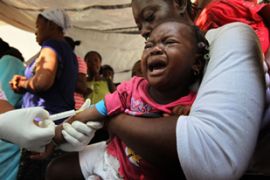‘Maternal mortality on the decline’
Improved research claims medical interventions in women’s health producing results.

However, a World Health Organisation (WHO) report that was released on Tuesday, estimated that between 300,000 to 500,000 women die in childbirth each year, while 3.6 million newborns do not survive their first month and an additional 5.2 million children die before their fifth birthday.
“The methodology has improved and numbers have become more accurate which means it can be reported more accurately,” Sippel said, referring to the Lancet report.
A number of reasons for the improvement in mortality rates were cited by the Lancet report.
This included lower pregnancy rates in some countries; higher income, which improves nutrition and access to health care; more education for women; and the increasing availability of people with some medical training to help women give birth.
Improvements in large countries like India and China helped to drive down the overall death rates.
The report also reveals that six countries account for over half of maternal deaths: India, Nigeria, Pakistan, Afghanistan, Ethiopia, and the Democratic Republic of Congo.
Sub-Saharan Africa still has the highest rates of pregnancy-related death in the world, and in some countries the numbers are rising. HIV/AIDS is a leading contributor to the increase.
“In Sub-Saharan Africa 60 per cent of those infected with HIV are women and last year 60,000 women died from this or related causes,” Sippel said.
Without HIV, annual maternal deaths would have been 281,500 in 2008, the report said.
“Many women’s health rights activists are very excited about these numbers. They always hear researchers say that 500,000 women die every year from pregnancy related deaths and now those numbers are down which means that funding that is going towards maternal health interventions is effective which means that we need more money,” Sippel said.
The study in the Lancet was based on more data than was previously available in addition to statistical modelling and was paid for by the Bill & Melinda Gates Foundation.
‘Catalyst, not brake’
Richard Horton, editor of the Lancet, said that these numbers “should act as a catalyst, not a brake, for accelerated action on Millennium Development Goals (MDG), including scaled-up resource commitments”.
The UN MDG aims to reduce maternal and child mortality by 75 per cent and 66 per cent, respectively, by 2015.
Countdown to 2015, a scientific and advocacy movement that works to achieve the above MDG, produced the WHO report in which it stressed that the deaths of millions of women and infants could easily be prevented by more widely adopting simple practices like hand-washing and immunizations.
Some 135 countries have child mortality rates of less than 40 per 1,000 live births or are on target to meet the MDG’s of a two-thirds reduction by 2015, according to Unicef.
But 39 countries are showing insufficient progress and 18 show no progress or a worsening of child mortality.
While poverty plays a major role, the report also points to a number of other reasons for high maternal and infant mortality rates in some countries.
The bulk of these deaths could be prevented with maternal care programs and better hygiene practices, the report said.
The WHO study also called for an additional $16bn to help expand global access to family planning methods and pre and post-natal care, as well as to hire millions of health care and community workers.
The investment would save the lives of up to a million women, 4.5 million newborns and 6.5 million children by 2015, the study found.
Ban Ki-moon, UN secretary general, held a press conference in New York on Wednesday to kick off a new global initiative on reproductive, maternal and newborn health.
The UN is also hosting a meeting of public health experts and heads of state on maternal and child health this week in New York, followed by another one in Washington in June.
“Given the dramatic difference between the results of these (Lancet) estimates and those reported by the UN, a process needs to be put in place urgently to discuss these figures, their implications, and the actions, global and in country, that should follow,” Horton said in a statement on the Lancet website.
“Two decades of concerted campaigning by those dedicated to maternal health is working. Even greater investment in that work is likely to deliver even greater benefits. This is a moment to celebrate – and accelerate.”